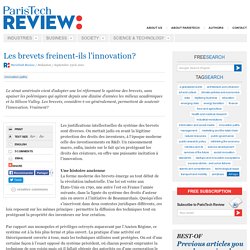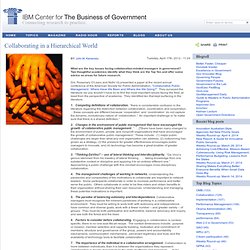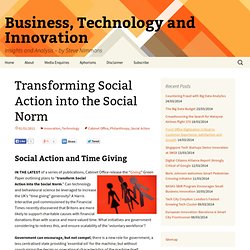

Les brevets freinent-ils l'innovation? Les justifications intellectuelles du système des brevets sont diverses.

On mettait jadis en avant la légitime protection des droits des inventeurs, à l’époque moderne celle des investissements en R&D. Un raisonnement macro, enfin, insiste sur le fait qu’en protégeant les droits des créateurs, on offre une puissante incitation à l’innovation. Une histoire ancienne La forme moderne des brevets émerge au tout début de la révolution industrielle. Une loi est votée aux États-Unis en 1790, une autre l’est en France l’année suivante, dans la lignée du système des droits d’auteur mis en œuvre à l’initiative de Beaumarchais. Quoiqu’elles s’inscrivent dans deux contextes juridiques différents, ces lois reposent sur les mêmes principes : permettre la diffusion des techniques tout en protégeant la propriété des inventeurs sur leur création.
Par rapport aux monopoles et privilèges octroyés auparavant par l’Ancien Régime, ce système est à la fois plus fermé et plus ouvert. Une épidémie de brevets? Home. Enchanter ses clients: une utopie? Collaborating in a Hierarchical World. Tuesday, April 17th, 2012 - 11:24 Tuesday, April 17, 2012 - 11:20 What are the key issues facing collaboration-minded managers in government?

Two thoughtful academics identify what they think are the Top Ten and offer some advice on areas for future research. Drs. Rosemary O’Leary and Nidhi Vij presented a paper at the recent annual conference of the American Society for Public Administration, “Collaborative Public Management: Where Have We Been and Where Are We Going?” 1. 2. 3. 4. 5. 6. 7. 8. 9. 10. Their conclusion? My sense is that practitioners have a more upbeat view of the whole field of collaborative governance and are less concerned with developing definitions than they are with sharing practices that work. Envisioning emerging technology for 2012 and beyond (by Michell Zappa)
Steven Johnson: Where good ideas come from. Le changement de paradigme. La sérendipité moteur de créativité et d'innovation en entreprise. Transforming Social Action into the Social Norm. Social Action and Time Giving IN THE LATEST of a series of publications, Cabinet Office release the “Giving” Green Paper outlining plans to “transform Social Action into the Social Norm.”

Can technology and behavioural science be leveraged to increase the UK’s “time giving” generosity? A Harris Interactive poll commissioned by the Financial Times recently discovered that Britons are more likely to support charitable causes with financial donations than with scarce and more valued time. What initiatives are government considering to redress this, and ensure scalability of the ‘voluntary workforce’?
Government can encourage, but not compel, there is a new role for government, a less centralised state providing ‘essential oil’ for the machine, but without constraining the design or operational characteristics of the machine itself. Solution Revolution: How Business, Government, and Social Enterprises Are Teaming Up to Solve Society’s Toughest Problems Social Action – Essential Characteristics.
Why It’s Tough To Decide. There is no progress without decisions. More strongly, decisions are unsung heroes of progress. Decisions are powerful – things are different after a decision. (You are different after a decision.) Before a decision it’s one way, and after, another. And once a decision is made, the follow-on actions are clear, straightforward, transactional. Progress is born from decisions and follow-on actions, but actions get attention and Gantt charts and decisions get short-suited. There are two types of decisions: made decisions and unmade decisions. Over the millennia unmade decisions have developed natural defenses. Unmade decisions know when they’re about to be decided – much like migratory birds sense gravitational fields.
But there’s hope. We must learn to spot unmade decisions, to call them out, and help our teams decide. Imagecredit:wikia. TED: Ideas worth spreading.